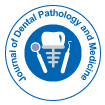Notre groupe organise plus de 3 000 séries de conférences Événements chaque année aux États-Unis, en Europe et en Europe. Asie avec le soutien de 1 000 autres Sociétés scientifiques et publie plus de 700 Open Access Revues qui contiennent plus de 50 000 personnalités éminentes, des scientifiques réputés en tant que membres du comité de rédaction.
Les revues en libre accès gagnent plus de lecteurs et de citations
700 revues et 15 000 000 de lecteurs Chaque revue attire plus de 25 000 lecteurs
Indexé dans
- Google Scholar
- ICMJE
Liens utiles
Revues en libre accès
Partager cette page
Abstrait
Assessing the degree of acceptance of dental treatments by children and adolescents through the use of behavioural treatment techniques
Madalina Croitoru
The purpose of this paper was to determine if behaviour management can modify in a positive manner the degree of acceptance of dental treatment in children and adolescents and to assess the influencing factors of the patients’ behavioural pattern.
One of the cornerstones in practicing paediatric dentistry is the ability to guide children positively throughout their dental experience and encourage positive dental attitude in order to improve their oral and overall health. Anxiety associated with the dental procedures can be reflected in the child’s behaviour. Therefore, it is important for dentists to evaluate psychological personal traits and to modify the management approach to reduce their anxiety.
A cross-sectional study was performed on 312 children aged 2 to 14 years (m.a. 6.44±0.19 years) attending the Pedodontics Dental Clinic of the “Carol Davila” University of Medicine and Pharmacy in Bucharest, Romania for routine dental care. The improvement of the patients’ behavioural pattern was attempted using the “tell-show-do” technique, positive reinforcement, ART technique, voice modulation, systematic desensitivation, non-verbal communication and behavioural modelling. Their behaviour was evaluated using Frankl’s scale at every visit at the clinic. Statistical analysis was performed using PSPP 1.2 afp005.
A positive modification of the behavioural pattern was recorded in 93.7% of cases. The main factors influencing the behavioural pattern were age and the use of ART techinique (p<0.05).
Behavioural treatment can be a valuable tool in improving the acceptance of dental treatments in children and adolescents
Revues par sujet
- Agriculture et Aquaculture
- Biochimie
- Chimie
- Food & Nutrition
- Génétique et biologie moléculaire
- Géologie et sciences de la Terre
- Immunologie et microbiologie
- Ingénierie
- La science des matériaux
- Le physique
- Science générale
- Sciences cliniques
- Sciences environnementales
- Sciences médicales
- Sciences pharmaceutiques
- Sciences sociales et politiques
- Sciences vétérinaires
- Soins infirmiers et soins de santé
Revues cliniques et médicales
- Allaitement
- Anesthésiologie
- Biologie moléculaire
- Cardiologie
- Chirurgie
- Dentisterie
- Dermatologie
- Diabète et endocrinologie
- Gastro-entérologie
- Immunologie
- La génétique
- Maladies infectieuses
- Médecine
- Microbiologie
- Neurologie
- Oncologie
- Ophtalmologie
- Pédiatrie
- Recherche clinique
- Soins de santé
- Toxicologie

 English
English  Spanish
Spanish  Chinese
Chinese  Russian
Russian  German
German  Japanese
Japanese  Portuguese
Portuguese  Hindi
Hindi